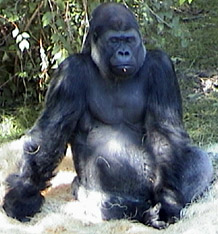Working with Orangutans, Gorillas and Black Crested Macaques
Through the Denver Zoo's animal enrichment program, I had the incredible opportunity to work with orangutans, gorillas, and black-crested macaques. I worked with individual zookeepers and the primates they cared for. My role was to design an essential oil program for each primate and teach the zookeepers how to work with the essential oils and the primates.
It was truly remarkable to work with these magnificent beings and to see them choose what essential oil they wanted and how they wanted it; we were watching them self-medicate. Another term for "self-medicate" is zoopharmacognosy. A term coined by Dr. Eloy Rodriguez, a biochemist, and professor at Cornell University, zoopharmacognosy refers to how animals self-medicate. In this process, animals select and use plants, soils, and insects to treat and prevent disease. The word zoopharmacognosy is derived from the roots zoo ("animal"), pharma ("drug"), and gnosy ("knowing").
The essential oils were offered to the primates twice a day. We placed the essential oils on clean rags, bedding or food and then handed it to them, and they either accepted the oil or rejected it by giving it back to us or tossing it aside. In the case of the orangutans, the zookeeper would offer the essential oil directly, and I constantly reminded her to hold onto the bottle because when they liked the oil, they would try to take it.
Sometimes they would hold out their finger and have some oil placed onto it, then apply it to themselves. This process, indeed, was fascinating to watch and be a part of. For example, each orangutan had its preference: Sally preferred hers on her lips, Robin liked the essential oil on top of his head or food, Mias placed it below his nose or on his forehead, and Allie wanted the oils on her lips, fingers or toys. The oils they did not choose were not used at that time.
Some of the conditions we addressed in the animals were distrust, pain, sinus problems, digestive upsets, anger, being easily aroused and fear. Some of the essential oils we worked with were violet leaf, rose, jasmine, fennel, basil, sweet marjoram, neroli and ginger. Working with these oils and others did result in some significant behavioral changes. For instance, regarding the orangutans: Robin and Mias typically become more aggressive toward each other during the winter months. In the past, they often spar using sticks through their mesh wire fence and douse each other with water. But after working with the essential oils (they both preferred basil), the zookeepers noticed their aggressive behavior had stopped. Sally's essential oils of choice were yarrow, violet leaf, rose and bergamot, all of which have, to varying degrees, anti-inflammatory and analgesic properties. Sally tended to move around stiffly, but after working with these essential oils, she began moving around quickly and with a new sense of playfulness. She started playing more often and in a more physical way.
Each primate has been affected in its unique way by the use of essential oils and their zookeeper's consistent work with them and the essential oils. This work has added to their quality of life in captivity. Working with essential oils is a non-invasive and natural approach to working with animals in captivity.



